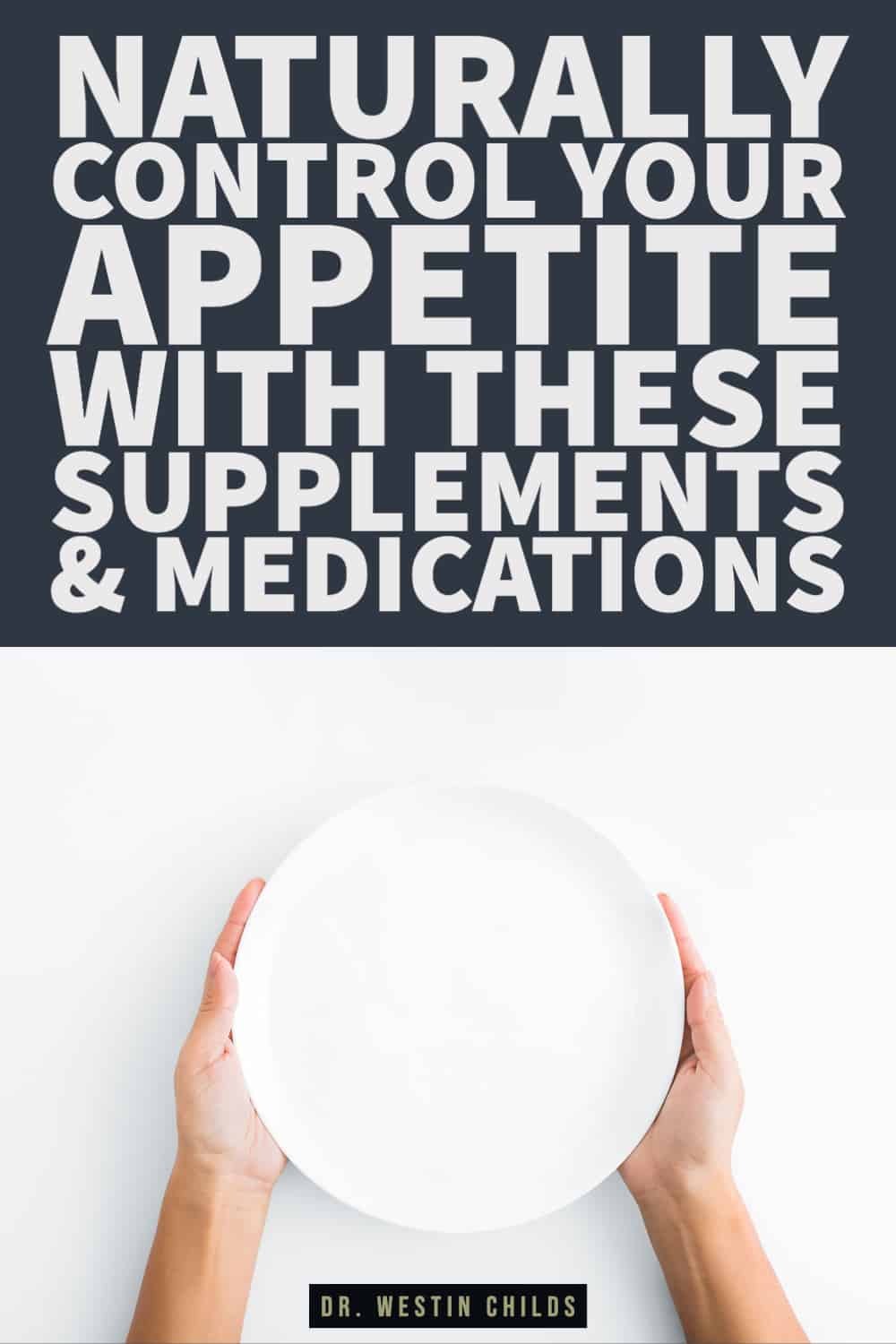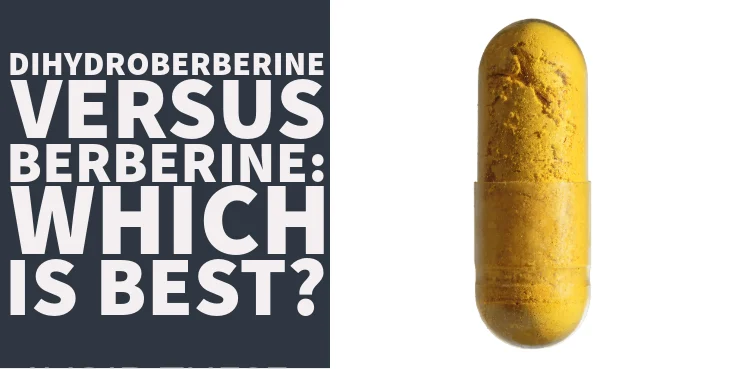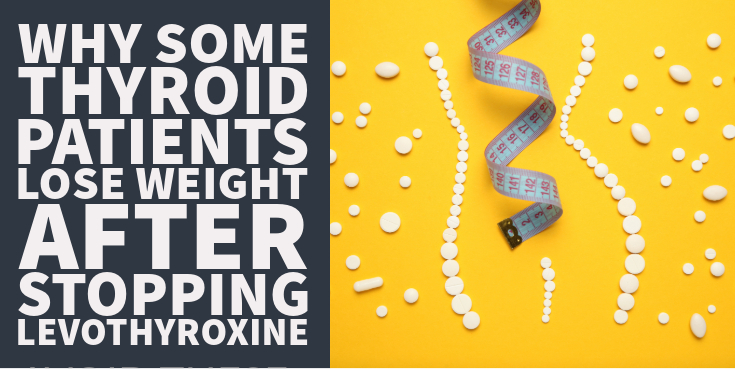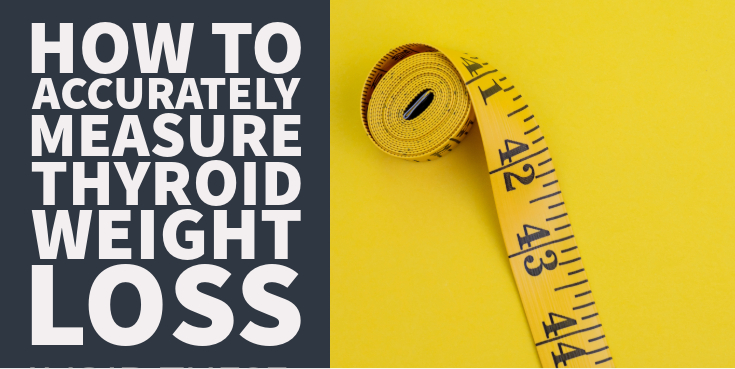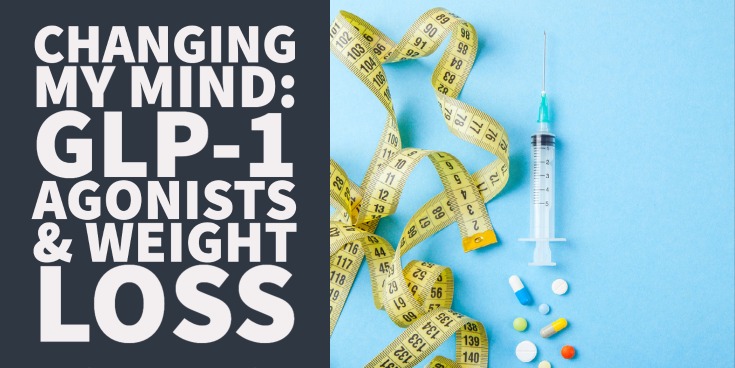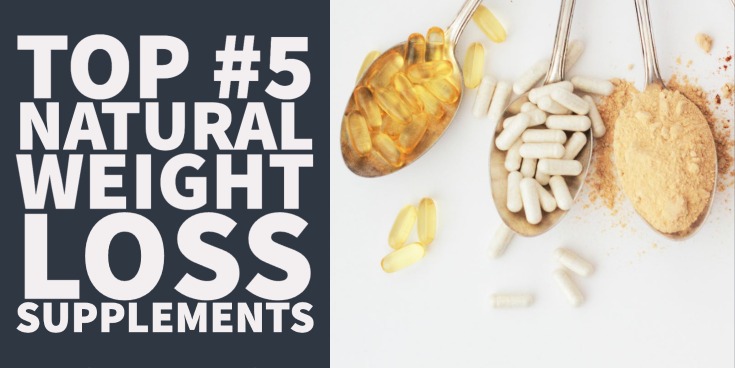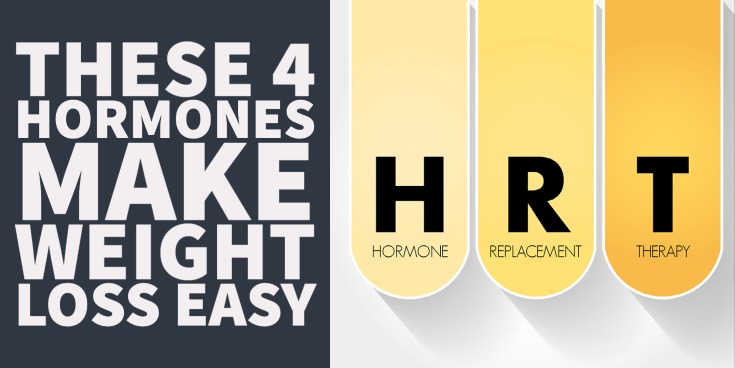Suppressing your appetite is actually quite easy, but does that mean you should do it?
Most people want to manage their appetite to help with weight loss, but did you know that too much caloric restriction can actually damage your metabolism?
In this post, I discuss how to use the best natural and prescription appetite suppressants, how to use them correctly, and how to determine if you should use them…
Should you suppress your appetite?
So you want to suppress your appetite, eh?
Well… hang on a minute, because you might not want to.
Appetite suppression is a component of weight loss (which is why most people want to do it), but it doesn’t come without a price.
Indiscriminate appetite suppression that leads to 21-28 days of decreased caloric intake may actually be damaging to your body.
Studies confirm that up to 4 weeks of daily calorie restriction (1) causes a total reduction in circulating thyroid hormone AND an increase in reverse T3 both of which lead to a reduction in metabolic rate.
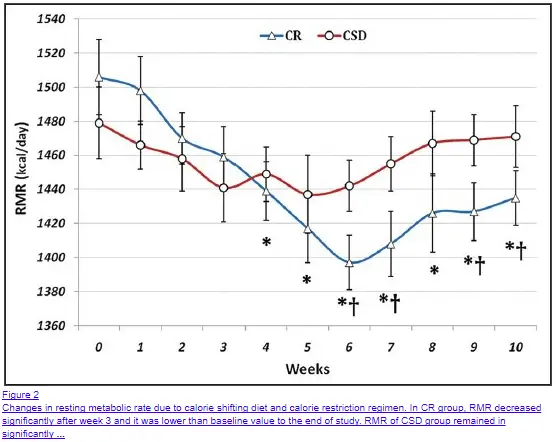
Yes, you may lose weight during that time, but you will be trading that weight loss for some metabolic damage.
This metabolic damage almost always results in people regaining their weight (sound familiar?).
It also comes with some hormone imbalances such as leptin resistance and thyroid resistance which make the next time you want to try and lose weight more difficult.
Does that mean you should stay away from appetite suppressants?
No, not necessarily.
Instead, it means that you want to use them correctly and in such a way that allows for weight loss WITHOUT negative consequences.
Part of doing it the right way is limiting the duration of how long you suppress your appetite.
For starters, you never want to suppress your appetite constantly and on a daily basis.
Instead, you can focus on intermittent suppression based on and around events or certain days.
One of the best uses of appetite suppressants is to prevent binge eating or overeating (which many people struggle with).
You can use these appetite suppressants at targeted times to help reduce the intake of food.
But you want to avoid daily and consistent appetite suppression for longer than 21 days at a time.
Using appetite suppressants in this way will help you lose weight without damaging your metabolism.
With this in mind let’s talk about which ones actually work (both natural and prescription)…
Natural Appetite Suppressants
Always start with natural appetite suppressants first.
They are easier to get, work quite well, and carry fewer side effects than their prescription counterparts.
In addition, they also serve as a more natural approach to weight loss and tend to be better tolerated.
When determining which appetite suppressant to use make sure you target it to your body and your problems.
You will find that most of these natural appetite suppressants provide some other benefits ranging from increased metabolic function to mood-balancing effects.
Find the one that works best for you and start there!
Note that in some cases it may be necessary to turn to prescription medications as these tend to be more powerful and also tend to provide more weight loss than natural formulations.
#1. Moringa oleifera
First on the list is a supplement, a plant actually, known as Moringa oleifera.
Moringa is a plant that contains many different phytochemicals ranging from amino acids, vitamins, and phenolic compounds all of which give this plant its special benefits.
Relevant to our discussion is that Moringa has been shown in studies to help directly with weight loss by reducing appetite (2).
The exact mechanism by which this occurs is not well-known but I believe it’s most likely mediated through hormone balance and regulation.
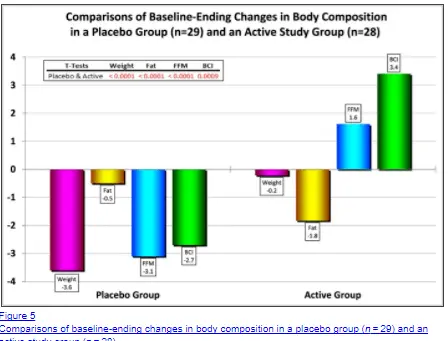
Some components within the moringa plant may help reduce both insulin and leptin levels and both of these hormones are involved in the central regulation of appetite and satiety.
Beyond the weight loss and appetite-suppressing qualities moringa also has many other benefits:
- It acts as an anti-inflammatory agent (3)
- Moringa helps reduce blood pressure and cholesterol
- It has anti-diabetic qualities (helps prevent insulin resistance)
- Helps protect against liver damage (hepatoprotective)
- Contains constituents that fight off bacteria and fungus (both anti-bacterial and anti-fungal)
Moringa should be considered if you are having issues controlling your appetite or you are struggling with food cravings AND you are interested in weight loss.
Moringa is ideal as a healthy appetite suppressant because it contains more than just 1 nutrient (compared to other appetite suppressants we will discuss below) and provides many other benefits beyond just reducing your appetite.
For best results, you should find an organic plant source that has been reduced to a powder.
This allows for easy use in smoothies and for easy blending.
To get the most benefit you will want to use 1-3 teaspoons of organic moringa powder daily.
Start with a morning smoothie and add Moringa to help reduce cravings throughout the day, as necessary you can also combine it with herbal tea to further help.
Start with a powder like this one for the best results.
PROS
- Helps reduce appetite and directly helps with weight loss
- May help reduce and reverse leptin resistance and insulin resistance
- Contains many beneficial phytochemicals, nutrients, and vitamins if you consume the whole plant
- Helps reduce inflammation and protects against liver damage
- Moringa is basically a plant so it’s like adding another set of fruit/veggies to your daily regimen
CONS
- May alter the taste of smoothies and teas (but not by much)
- It may not work for everyone
#2. L-Glutamine
L-Glutamine is an amino acid that is well-known for its beneficial effects on the intestinal lining and its use in healing the gut (4).
What many people may not realize is that L-glutamine is also a potent appetite suppressant if used in high enough doses throughout the day.
It’s basically tasteless and dissolves rapidly in water which makes it even easier to use on a daily basis.
It’s not exactly clear how L-glutamine impacts appetite, but it’s most likely mediated through beneficial effects in 2 main areas:
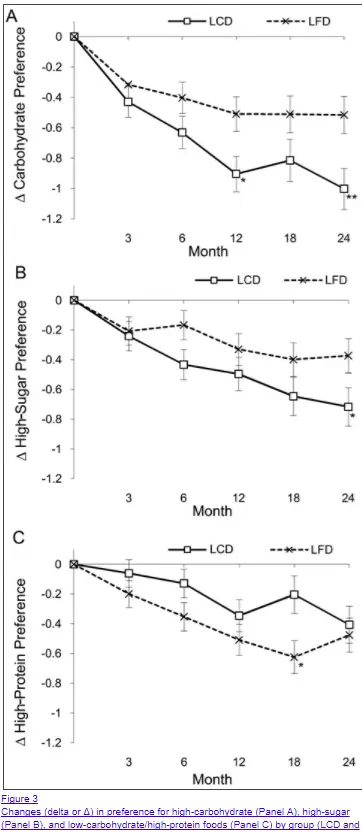
First:
It may help alter and improve gut bacteria in your gastrointestinal tract.
It’s no secret that the type and amount of gut bacteria influence your appetite, mood, and immune function and L-glutamine may be impacting this system to help alter bacteria and promote satiety.
Second:
L-glutamine is a protein! And protein is a powerful appetite suppressant, especially when compared to both fat and carbohydrates.
Daily use of L-glutamine can be combined with dietary changes to promote a feeling of fullness and satiety.
This phenomenon is seen in patients who adopt a low carbohydrate/high protein diet (5) or a ketogenic diet.
Consuming L-glutamine can also help reduce carbohydrate cravings (help curb your sweet tooth) which may promote further changes to your intestinal microbiota.
To get these benefits it’s best to use L-glutamine on a daily basis, up to 5-10 grams per day (you won’t be able to get this high dose with capsules).
You can dissolve 2 grams (or more) of L-glutamine in water and drink it whenever you feel your sweet tooth kicking in.
I recommend using a brand such as this one for the best results.
PROS
- May help promote weight loss in addition to reducing appetite
- May help improve gut function
- Reduces sugar cravings as well
- Dissolves rapidly in water
CONS
- May need to use high doses (up to 10 grams per day)
#3. CLA (Conjugated linoleic acid)
CLA stands for conjugated linoleic acid and CLA is really just a family of fats commonly found in animal meat, dairy products, and of course certain supplements.
CLA is special in that it has several anti-obesity properties that help fight weight gain on multiple fronts.
CLA is also unique among supplements and nutrients in that it has been well studied with hundreds of literary papers showing its efficacy to date.
One problem with CLA is that it works extremely well in animal models, but much of the benefits seen in animals have not translated 100% to humans.
Part of this problem seems to be due to insufficient dosing (meaning you need to take enough of it) and length of treatment time (you need to take it long enough).
Pertinent to our discussion, CLA not only promotes weight loss but it’s also a potent appetite suppressant.
In fact, most studies show that even if CLA doesn’t lead directly to weight loss it does reduce appetite (6):
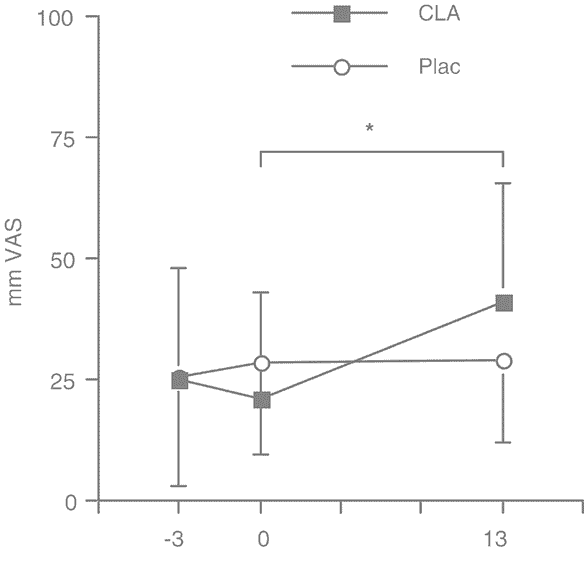
Taking high enough doses of CLA helps promote feelings of fullness and reduces appetite.
Beyond appetite suppression CLA also helps fight obesity in the following ways:
- Increases energy metabolism (7) (promotes an increase in metabolism)
- Increases fat breakdown and reduces fat creation
- Helps reduce inflammatory markers and whole-body inflammation
- Impacts lipid and cholesterol levels
- Reduces insulin resistance and has anti-diabetic properties
You can get CLA from food, but in order to get high enough doses to impact your weight, you would need to eat ridiculous amounts of food – something like 20 pounds of beef!
You can sidestep this problem by taking high-quality supplements that have sufficient dosing.
The only downside is that you will need to take multiple capsules.
I recommend using a CLA supplement that contains a high enough dosage (at least 4,000mg per day and from a plant source if possible) like this one.
If you plan to use CLA make sure you use it daily for 12 weeks if you stick to these guidelines you should see results.
PROS
- Clinically proven to help reduce appetite
- May also help reduce fat uptake into fat cells by lowering lipoprotein lipase activity
- Promotes normal blood pressure and cholesterol levels
- Also helps reduce inflammation
CONS
- Must be used in high dosages for ideal results (at least 4,000mg per day)
- Should be used daily for at least 12 weeks
#4. Caffeine
Caffeine is another well-known appetite suppressant, but it’s not without flaws.
The problem with caffeine is that most people use it daily, and they use too much of it.
Excess caffeine consumption can actually cause an increase in appetite, reduce sleep quality and ultimately cause a reliance upon it for energy status.
Having said that caffeine is still worth mentioning here.
Caffeine works to reduce appetite by acting as a mild stimulant.
Caffeine helps increase focus, promotes mental clarity (8), and may actually aid slightly in weight loss.
The best way to use caffeine is by taking a small amount (50-100mg maximum per day) first thing in the morning.
It’s best to take caffeine before noon each day (earlier if you are sensitive to it) and take no more than 100mg per day.
It’s also important to take caffeine “holidays” or days in which you don’t use caffeine to help resensitize your body to its effects.
If you want to use caffeine I recommend using a healthy energy drink alternative that combines natural caffeine sources with energy-producing vitamins and nutrients.
This will help keep you full, increase your energy and promote mental clarity.
PROS
- Proper use promotes mental clarity, and focus and may help with weight loss
- Easy to find, cheap and effective
CONS
- Taking too much may cause harm by reducing sleep, increasing fatigue, and increasing appetite
- Need to find a high-quality source free of artificial sweeteners, sugars, and other additives
- May cause a jittery sensation in sensitive patients
#5. 5-HTP (5 Hydroxytryptophan)
5-HTP is a serotonin precursor that can be taken with an oral supplement.
It’s thought that by taking 5-HTP you are promoting the synthesis (or creation) of serotonin in the brain and body by providing the direct precursor.
We already know that serotonin levels influence appetite (9) and studies have shown that feeding causes an increase in 5-HT in the brain.
The idea is to provide serotonin directly to bypass the effects of eating and “trick” the brain into thinking you’ve already had a meal.
But does it work?
Some studies do indeed show that taking 5-HTP may actually reduce excessive food intake (10) and reduce appetite but there is a catch.
This effect seems to be present in people who are overeaters due to stress!
This is both good and bad.
Good in the sense that taking 5-HTP may provide a way for stressful eaters to curb their appetite and bad in the sense that it probably won’t work for everyone.
It’s also worth pointing out that 5-HTP can also be used to treat depression, regulate mood and help with weight loss.
If you suffer from any of these conditions AND you are a stress eater then using 5-HTP may be your best bet.
For best results, you will want to take 100-200mg of 5-HTP each day (preferably at night time). Make sure to use a high-quality supplement like this one.
PROS
- Helps reduce overeating and binge eating from stress
- May also help regulate mood and depression
- Can be used as a mild sleep aid in people with sleeping issues
CONS
- Will not work for everyone
- Need to use up to 200mg per day for best results
- May impact mood and/or cause drowsiness in some people
#6. Sparkling Mineral Water
This is probably my favorite of all of the natural appetite suppressants.
Why?
Because it’s very effective, it’s cheap and it’s incredibly safe.
Sparkling water is simply mineral water that has been infused with natural carbonation and that’s what gives it special properties.
Carbonation (from any source really) acts in the stomach to activate stretch receptors and send signals to your brain that you are “full”.
Combine this with the fact that the water contains essential minerals that improve the taste and increase its nutritional value and we are on a roll.
Another benefit to sparkling mineral water is that you can add essential oils to it to increase the flavor and further increase appetite suppression.
The best way to use sparkling mineral water is RIGHT when you wake up, first thing in the morning.
This will help fill your stomach, reduce your appetite (and help if you are intermittent fasting), and rehydrate you after the diuresis from the night before.
The best brands to get include San Pellegrino and Perrier – just make sure you avoid any artificial flavors or sweeteners when you buy them.
Also, opt to buy glass containers which further reduces your risk of coming into contact with endocrine disruptors.
How effective is it?
It’s cheap, very effective, and tastes great, it ranks 8/10.
PROS
- Reduces appetite by increasing stretch receptors in the stomach
- Contains helpful minerals
- Contains natural carbonation which improves flavor
- Can add essential oils to further enhance results and improve taste
CONS
- None! If you don’t know where to start then start with this option.
#7. Glucomannan
Glucomannan is an amazing tool for reducing appetite.
Glucomannan is an active component in the konjac plant.
Glucomannan is unique in that it is considered a “viscous fiber”.
When you consume it, along with plenty of water, the fiber fills and expands inside your stomach and presses on the stretch receptors.
This sends signals to your brain that you are “full” and reduces your appetite.
Glucomannan is also beneficial in that it acts as a sticky glue-like substance in your GI tract and can slow down the absorption of macromolecules, especially carbohydrates.
Because of this, you can use Glucomannan to help reduce appetite, treat insulin resistance and help with weight loss.
In one study (11) people who used 1 gram of Glucomannan along with 8 ounces of water 1 hour prior to each meal lost on average 5.5 pounds over 8 weeks.
To use it correctly you need to make sure that you use it before each meal and consume it with a large glass of water (preferably 8-12 ounces).
You can find the glucomannan capsules that I recommend here.
PROS
- Helps reduce appetite by expanding in the stomach
- Also helps treat insulin resistance and delays macromolecule absorption
CONS
- Must be taken with you wherever you go and consumed before each meal
Prescription Appetite Suppressants
Prescription medications have the advantage over natural appetite suppressants in that they almost always have other beneficial side effects such as the ability to reduce insulin/leptin resistance or balance other hormones.
They also tend to carry with them more side effects, but many of these side effects can be mitigated by using the medications correctly.
As with natural appetite suppressants, it’s wise to use each medication CORRECTLY and only if necessary.
Remember:
Your goal should be to lose weight by reducing the amount of “bad” calories that you consume and not just indiscriminately reduce all sources of calories.
#1. GLP-1 Agonists
GLP-1 agonists might be one of the single most effective prescription appetite suppressants (12).
These medications act on the glucagon receptor which triggers a cascade of beneficial changes inside your body.
First:
It reduces your appetite by slowing down your intestinal tract.
This causes reduced gastric emptying which sends a signal to your brain which makes you feel full.
This effect is almost immediate and quite powerful.
Second:
While simultaneously reducing appetite these medications also directly reduce both insulin and leptin levels (13).
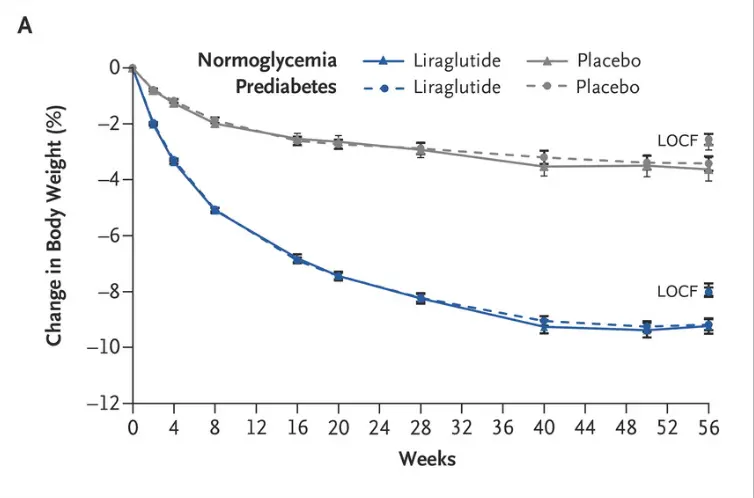
Insulin and leptin are very powerful hormones that help regulate fat cells inside your body.
When these hormones get out of balance you may develop resistance syndromes (known as leptin resistance and insulin resistance) which cause your body to “cling” to fat.
Many individuals (up to 50% of people in the United States) suffer from these resistance syndromes, so there is a good chance that you might have it as well.
Third:
GLP-1 agonists directly help with weight loss as well!
This effect is likely mediated through the changes made to appetite and hormone levels, but either way, these medications are very powerful at helping with weight loss.
Many studies show that people can lose up to 10-15% of their body fat over several months while using these medications.
The good news is that because these medications help to lower leptin levels they may also combat and reduce any weight gain after you stop the medications.
How effective are they at reducing appetite and helping with weight loss?
In my experience, I rate these medications a 10/10.
PROS
- Helps reduce appetite and directly helps with weight loss
- Helps reduce leptin resistance and insulin resistance
- Very powerful and very effective
- FDA Approved for weight loss
CONS
- Very expensive unless insurance covers them
- May be difficult to get a prescription from your doctor
- May cause other unintended side effects
#2. Phentermine & Phendimetrazine
These are probably among the most well-known prescription appetite suppressants.
Phentermine is a medication with pharmacology that is similar to amphetamines.
Phentermine acts by directly reducing your appetite while simultaneously increasing your basal metabolic rate (14) (energy production).
The effects of combined energy production cause you to burn more calories while reducing your need to consume calories.
The problem with phentermine is that it is a stimulant.
This means that it may carry with it many negative consequences:
- Phentermine may become addicting and your body may become dependent upon it over time
- It may be too powerful or too stimulating for certain patients – these people may experience jittery or increased anxiety while taking it
- Phentermine causes weight loss while you are using it but weight gain almost always occurs after you stop the medication
- Because it stimulates your body it may put an increased demand on your heart which may increase blood pressure over time
- Daily use of phentermine may interfere with your sleep or cause insomnia
Phendimetrazine works in a similar way and carries with it almost all of the potential side effects listed above.
Does this mean you should never use phentermine?
Not necessarily, but it must be used correctly.
For best results, you want to make sure you don’t use phentermine every single day (this prevents tolerance) and you want to use it for a short period of time.
It may be helpful to prevent you from binging on certain stressful days of the week or may help to reduce the amount of food you eat when eating out with friends, etc.
Another benefit of using phentermine is that most Doctors are aware of this medication and may be willing to prescribe it to you.
And, yes, phentermine has been studied and has been proven to help reduce weight if used for a short period of time.
How effective is phentermine?
Phentermine works in most people, which is a good thing, but also carries with it many negative side effects – it gets a 5/10.
PROS
- Powerful appetite suppressant
- Easy to get (compared to other medications)
- Cheap (compared to other medications)
CONS
- Has many negative side effects
- Weight may come back if you stop using it
- May put increased demand on your heart and increase blood pressure
#3. Wellbutrin
Wellbutrin is another medication that can help reduce appetite.
Wellbutrin is a popular medication used to treat both depression and anxiety and it works by altering certain neurotransmitter levels in the brain.
Among these neurotransmitters is serotonin which has been shown, along with leptin, to control appetite.
Wellbutrin is also noteworthy among anti-depressants in that it does NOT cause weight gain.
Traditional anti-depressants such as the SSRIs are known to cause up to 10 pounds of weight gain without altering appetite (most likely hormonal mediated).
Wellbutrin has been shown to be very effective at reducing binge eating behavior and can be used to help reduce cravings and appetite (15) in certain individuals.
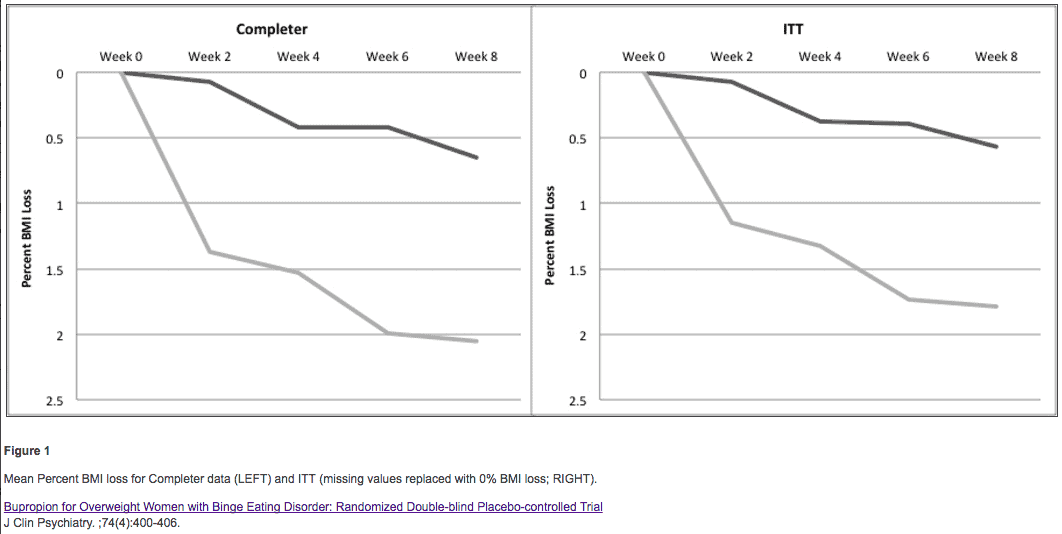
It’s also one of the 2 medications in the popular weight loss medication Contrave.
Contrave combines both Wellbutrin and naltrexone (we’ll talk more about this below) and together this combination helps reduce appetite and binge eating behavior.
Wellbutrin is, therefore, an effective medication to help with both appetite and weight loss if you suffer from both binge eating AND depression.
It can also be used to modulate appetite in people without depression – meaning you can use it for appetite suppression by itself if you don’t suffer from depression.
The good news about Wellbutrin is that it is well tolerated – meaning generally most people don’t have any negative side effects while using it.
The downside is that it only works in certain individuals, but in those people, it tends to work quite well.
How effective is Wellbutrin?
Wellbutrin tends to work in people with depression and those with binge eating disorder, it ranks a 6/10 in terms of effectiveness.
PROS
- Helps reduce food cravings and binge eating
- Also treats depression
- Well tolerated with few side effects
- One of the few anti-depressants that do not cause weight gain
CONS
- Appetite suppression is generally used off label (which means it may be difficult to get)
- Doesn’t work in everyone
#4. Naltrexone (& LDN)
Naltrexone is not a very well-known appetite suppressant but it is still effective and worth discussing.
Naltrexone, otherwise known as LDN (which stands for low-dose naltrexone) is a special medication that works by acting on opiate receptors.
It’s not well understood how it impacts both weight and appetite, but taking this medication has been shown to reduce cravings, help with weight loss, promote insulin sensitivity, and alter thyroid hormone function.
LDN is also commonly used to treat autoimmune diseases ranging from Crohn’s disease to Hashimoto’s thyroiditis.
LDN has also been shown to have potent anti-inflammatory effects (16) as well.
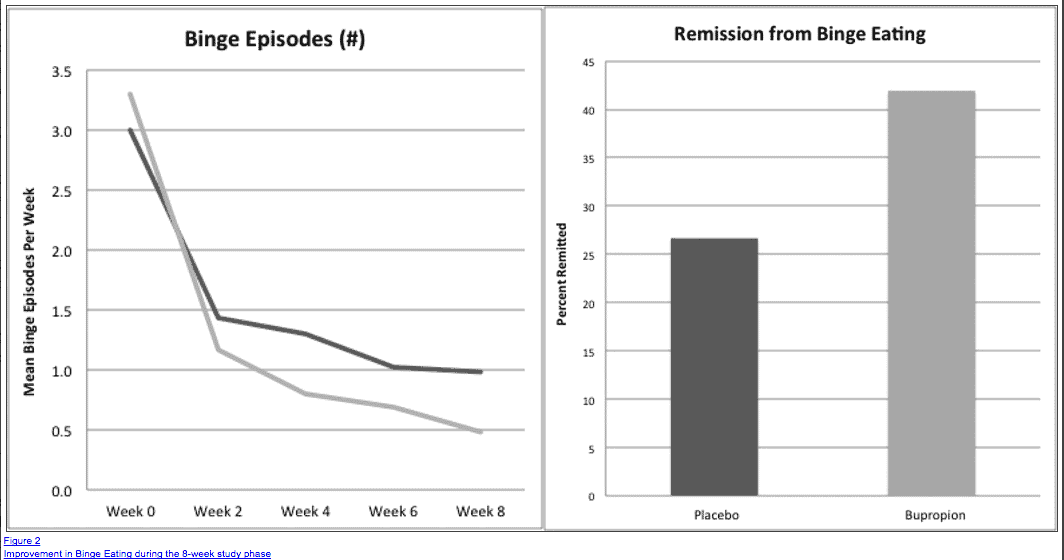
Naltrexone is combined, along with Wellbutrin, in the weight loss medication Contrave.
This combination likely helps by reducing appetite, balancing hormones, and promoting a reduction in inflammation.
Naltrexone can be used by itself or in combination with Wellbutrin for weight loss and appetite suppression.
You can read more about how to use Naltrexone for weight loss in this post.
Like Wellbutrin, Naltrexone tends to work very well in certain individuals.
If you have food cravings, thyroid disease, autoimmune disease, or depression then Contrave or Naltrexone (by itself) would be worth considering.
Another huge benefit to using Naltrexone is that it is very well tolerated meaning it has very few negative side effects.
How effective is it?
Naltrexone rates 7/10 in terms of effectiveness.
PROS
- Works to help reduce appetite, balance food cravings and promote weight loss
- May also help reduce insulin resistance and increase thyroid function
- Very few side effects (it either works or it doesn’t)
CONS
- Difficult to get from conventional physicians
- Not a lot of research on its use
- May not work in every person
#5. HCG
HCG is the hormone and is part of the well-known HCG diet.
It’s important to separate the hormone from the diet, and in this case, the hormone has a lot of benefits if it isn’t combined with the calorie-restricted diet.
HCG stands for human chorionic gonadotropin and is released in massive amounts during pregnancy.
HCG as a hormone has several beneficial properties that can actually promote weight loss (if used safely and correctly and NOT combined with calorie restriction).
For instance:
HCG can help promote fertility in men by normalizing testosterone.
HCG can help balance estrogen and progesterone levels in women and may promote ovulation and thus increase fertility.
Various studies have also shown that HCG seems to promote thyroid hormone activity (17) which can increase metabolism.
And, lastly, HCG can be used to help reduce appetite and normalize food cravings.
The trick with using HCG is that you must use it correctly (only 1-2 times per week) and it should not be combined with extreme calorie restriction (like the 500 calorie/day diet).
HCG gets a bad name because of its use in the HCG diet so it’s very important to separate the hormone from the diet.
HCG works very well in both men and women but particularly in women with thyroid disease and estrogen/progesterone imbalances (those with menstrual irregularities).
How effective is it?
HCG, when used correctly, rates a 7/10.
PROS
- Promotes normal sex hormone balance in both men and women
- Also increases thyroid function which may further help with weight loss
- Safe to use in low doses
CONS
- Difficult to get due to the misunderstanding of the hormone HCG vs the HCG diet
- Must be injected to be effective
- Not well known among physicians and must be used off-label
#6. Atomoxetine
Last on the list is Atomoxetine which is a selective norepinephrine reuptake inhibitor.
Norepinephrine is a neurotransmitter that increases overall activity and may promote an increase in alertness, focus, and energy.
This medication is actually FDA-approved to treat ADHD and it’s one of the only ADD medications that is not a scheduled medication.
Atomoxetine is only mentioned here because one of the side effects of excess nor-epinephrine (the neurotransmitter) is appetite suppression and nausea (18).
One of the downsides to using Atomoxetine is that it does cause nausea and the amount can vary from individual to individual.
Generally, it’s best if we can suppress your appetite WITHOUT causing nausea, but it is one of the side effects of this medication.
Atomoxetine is beneficial in that it is not a scheduled medication and therefore has less addictive potential.
It can be considered among individuals who find themselves too sensitive for the stimulant-based appetite suppressants (like phentermine) or who have failed other medications on the list.
It tends to work best in those individuals who already suffer from adult-onset ADHD and who also suffer from food cravings and the inability to lose weight.
How effective is it?
Atomoxetine rates 5/10 in terms of effectiveness and should not be the first-line medication unless it is your only option.
PROS
- Cheap and easy to get because it is not a scheduled medication
- May help in those who suffer from food cravings AND ADHD or ADD
CONS
- May cause nausea along with appetite suppression
- May also promote insomnia which can increase weight gain
- Should not be your first line medication for appetite suppression
Conclusion
The bottom line?
There are MANY proven ways to take control of your appetite and curb your cravings for both sugary and sweet foods.
Both supplements and prescription medications have been shown in clinical studies to regulate appetite in a variety of ways.
The choice between prescription medications and supplements depends on you and your goals.
You can get started right away with simple options such as sparkling mineral water or other nutrients such as CLA.
Make sure to tailor your choice to the goals that you have.
If you are serious about weight loss or know that you have multiple hormone imbalances, then you may want to consider prescription medications over supplements – or simply use a combination of both.
Before you choose to suppress your appetite remember this:
Long-term suppression of your appetite and reduced caloric intake can cause metabolic damage, so you must be careful!
Make sure to take frequent breaks and never suppress your appetite for more than 21 days in a row.
Now it’s your turn:
Have you tried any of the options listed above?
If so, which one worked best for you?
Leave your comments below!
